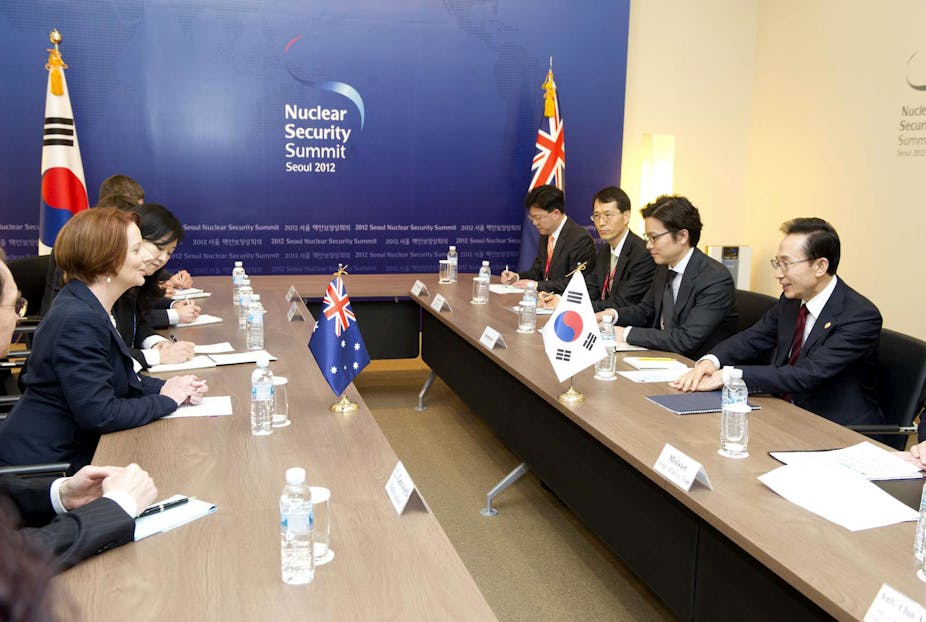Prime minister, Julia Gillard joined 52 other world leaders at the second round of the Nuclear Security Summit in South Korea.
In her address to the summit, she joined other participating states in advocating increased inspection powers for the Interational Atomic Energy Agency (IAEA), and greater co-operation between governments, NGOs, and corporations involved in the nuclear power industry. All this in an attempt to strengthen safeguards against nuclear materials being acquired by terrorists.
Gillard disappoints
While this was all good advice from the prime minister, it was not particularly groundbreaking. This trip showed Gillard’s fairly weak grasp of foreign policy hasn’t improved, embarrassingly demonstrated by her shallow answers to questions from Korean students following her speech in Seoul.
This is somewhat disappointing, given the activist record of previous Labor Governments. The Canberra Commission on the Elimination of Nuclear Weapons – the establishment of which was one of the final acts of the Keating government – outlined a plan for stronger nuclear arms control, and eventually, complete global nuclear disarmament in 1996.
Many of these ideas were used again in the International Commission on Nuclear Non-proliferation and Disarmament (ICNND), set up by former prime minister Kevin Rudd, in co-operation with Japan. This became an important impetus for President Barack Obama’s Prague Declaration in 2009, on the goal of global nuclear disarmament, as well as the first Nuclear Security Summit, initiated by Obama in 2010.

The Seoul Summit is a continuation of this process (with a third summit in the Netherlands scheduled for 2014). It expands from US cooperation with Russia since the end of the Cold War, to secure ex-Soviet fissile materials.
The summit is therefore an important part of Obama’s nuclear arms control policy with Russia. This has now become a minor issue in the 2012 US election due to Obama’s “live mic” gaffe with outgoing Russian President Dmitry Medvedev, in which he suggested he could deal with missile defence following his assumed re-election in November.
Gillard is nevertheless continuing Australia’s commitment to the diplomacy of non-proliferation, with arguably not as much enthusiasm as Rudd. As for the Coalition, Tony Abbott and Julie Bishop advocate shutting down the ICNND.
Despite criticism about the overall state of nuclear security, Australia can point to its top rating by the Nuclear Threat Initiative, as having the best security in the world for states with weapons-usable nuclear materials.
The spectre of North Korea
The issue that unofficially dominated the summit was of course, North Korea. Obama gave a speech (below) directly warning the new leadership under Kim Jong Un against the rogue nation’s upcoming “satellite” rocket launch planned for April 12-16. He said North Korea’s usual strategy of extorting diplomatic concessions through threat and bluster would be ultimately unsuccessful. He took another diplomatic swipe in his speech against Iran, the other crisis point for non-proliferation.
Obama’s declaration further emphasises how US foreign and defence policy priorities are moving back towards the Asia-Pacific, relying more on its regional allies, as the US attempts to reduce its overall defence budget.
It ties into the USA’s tacit support for Japan activating its ballistic missile defence system to intercept any North Korean rocket materials.
The US sees Japan as retaining its strategic importance in Northeast Asia, as it had throughout the Cold War, as the “frontline” against North Korea, and also as potential strategic counterweight to the growing military power of China.
Strategic shifts
Gillard joined the chorus, warning Pyongyang not to go ahead with its rocket test, while acknowledging that North Korea is not really a direct threat to Australia. Still, the Northern Territory is now nominally within its missile range.
One indirect outcome of the summit appears to be the continuation of closer US-Australian defence cooperation.
As political pressure builds within Japan for the US to reduce its direct military presence there, Australia will soon see US forces in Darwin.
And now, there are the reported talks on the possible future deployment of US drones on the Cocos Islands.
While improving the security of nuclear materials against terrorist threats is indeed important, the Seoul Summit has highlighted ongoing shifts of the strategic landscape of the Asia-Pacific region.

